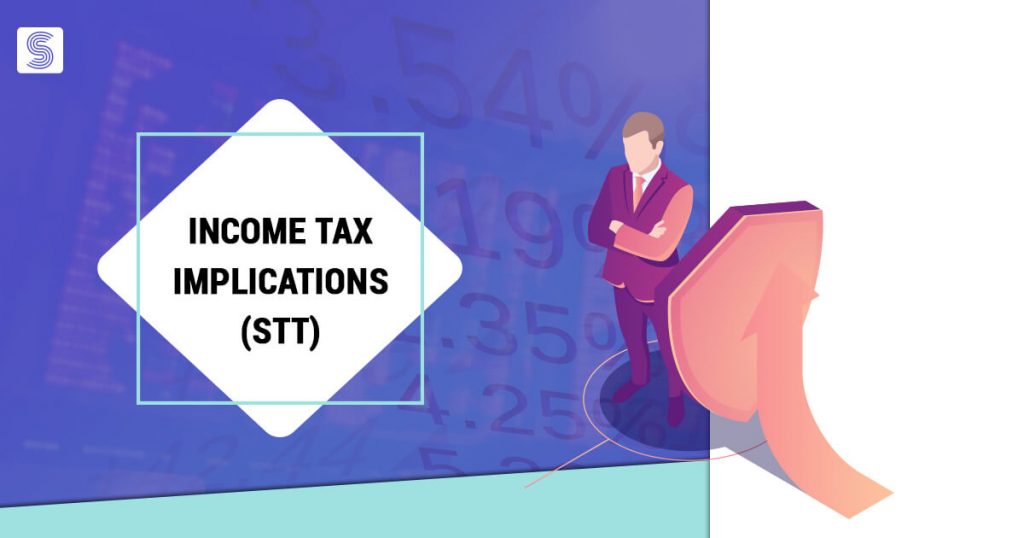Securities Transaction Tax (STT) Rules 2004 – Income Tax Implications

Savvy Midha | Updated: Dec 02, 2019 | Category: News, SEBI Advisory
Securities Transaction Tax Rules 2004 introduced with effect from 2004 by the then Finance Minister, Mr. P. Chidambaram [1] to cover the purchase and sale of securities under the ambit of Income Tax Implication. Securities Transaction Tax stands for STT applied to all the transactions related to equity.
Securities Transaction Tax was introduced with a motive to allow the deductions on sale and purchase of securities to ensure gains arising from such transactions are taxed at source. Thus, it prevents any form of evasion of capital gain tax liability.
Table of Contents
When is Security Transaction Tax Paid?
STT is levied on every purchase or sale of securities such as shares, derivatives, equity-oriented mutual funds, etc., listed on any recognized stock exchange. The tax rate varies as per the transaction and securities dealt with and is determined by the Central Government.
Tax is deducted at source during transaction takes place, which increases the overall cost of the transaction. Broker or Asset Management Company (AMC) deducts TDS on securities transactions when the transaction is done.
Scope of Security Transaction Tax
STT is applicable for the transactions of the following securities:
- Share, scrip, bonds, debentures, or any other marketable securities of any company or body corporate
- Derivatives
- Units or any other instrument issued through any collective investment scheme
- Government securities
- Rights or any form of interest in securities
- Equity-oriented mutual funds
Security Transaction Tax is not applicable on any off-market transaction.
Rates of Security Transaction Tax
Securities Transaction Tax is levied on various transactions at the following rates:
- Purchase and Sale of Equity Shares listed on the recognized stock exchange: 0.1%
- Sale of units of equity-oriented mutual funds: 0.001%
- Sale of securities such as equity shares, units or any equity-oriented mutual funds in a mode other than actual delivery or transfer: 0.025%
- Sale of options known as Derivatives: 0.125%
- Exchange-traded funds: 0.001%
- Sale of unlisted shares under IPO to the public after which shares are listed on the stock exchange: 0.2%
Price for Levy of STT
Following chart depicts the value on which STT is levied:
| Particulars of Transactions | Value for Levy of STT |
| Purchase of Equity Shares | STT is paid by the purchaser on the price at which shares are purchased |
| Sale of Equity Shares | STT is levied on the sale price and is paid by a seller |
| Sale of units of mutual funds, equity shares or equity-oriented mutual funds (other than actual delivery or transfer) | STT is paid by the seller on a price at which unit is sold |
| Sale of future securities, i.e. Sale of future securities, i.e. derivatives | STT is levied at the price on which such futures are traded and is paid by a seller of derivative |
| Sale of shares through IPO to Public | Seller is liable to pay STT on the price at which it issues the share to the public for subscription |
STT on physical delivery of Derivatives
Derivatives settlement takes place in cash, and there is no physical delivery of cash. Profit incurred out of trading of derivatives is paid and received by the parties involved in the contract. SEBI vide notification dated 14th April 2018 issued a list of several stocks for which derivative contracts would be settled against cash for the physical delivery of shares. However, bit uncertainty prevails related to the rate of STT on such transactions.
The petition was filed by the Association of National Exchange Members of India against stock exchange against levy of 0.1% of SST on the physical delivery of Derivatives. Upon the receipt of the application by Bombay High Court, it sought the comments of CBDT in the matter. CBDT upon the receipt of an application for its comments clarified the matter by the issue of clarification dated 27th August 2018 in which it observed that derivatives sold by physical delivery of shares should be treated similar to such transactions of sale of equity shares settled by the actual delivery of shares.
Due Dates
Following are the due dates for payment of STT and return filing of the same are as follows:
- Payment of STT: STT has to be deposited within the 7th of the following month in which STT is collected or deducted.
- Return filing: STT return shall be filed online annually by a recognized stock exchange or mutual funds within 30th June of the financial year succeeding financial year in which STT was collected or deducted.
Income Tax Implications on STT
Following is the tax implication on SST as per the several natures of income:
- Capital Gain Tax: With the introduction of SST, the simultaneous section was introduced for the benefits of a taxpayer who incurred SST. Until 31st March 2018, capital gain incurred on the sale of shares or equity-oriented mutual funds subject to STT is taxed at Nil Rate.Long term capital gains from such transactions are exempted from taxation while short term capital gains are subjected to tax at a concessional rate of 15%.
However, to curb the practice of increased tax evasions and other unfair practices, Finance Budget 2018, effective from 1st April 2018 withdraw the exemption and long-term capital gain on equity shares and equity-oriented mutual fund thereafter was taxed at concessional rate of 10%
- Business Income Tax: STT paid is allowed to claim as a business expense in cases the person trades security and offer income by doing such business.
Wrapping up the Article
Also, Read: What is Securities Transaction Tax- A Complete Guide.














